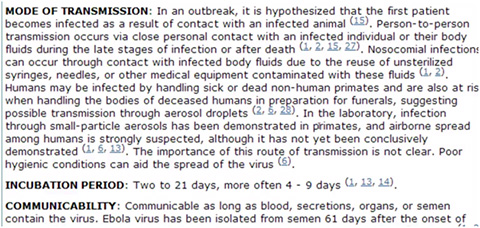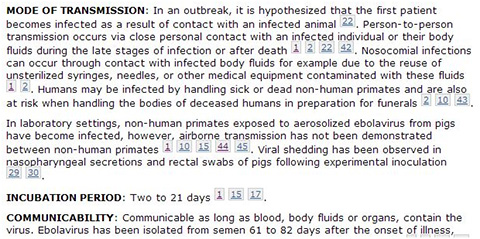
Ronald R. Cherry
Politically correct Ebola
By Ronald R. Cherry
Sometime during the last week the Public Health Agency of Canada changed its website's content regarding Ebola transmission. Last week I published a preliminary essay on the Airborne Transmission of Ebola, and more recently comprehensive essays, all citing the Canadian PHA's section entitled "Mode of Transmission."
8-06-14:
"In the laboratory, infection through small-particle aerosols has been demonstrated in primates, and airborne spread among humans is strongly suspected, although it has not yet been conclusively demonstrated."
8-25-14:
"[A]irborne transmission has not been demonstrated between non-human primates."
Why did the Public Health Agency of Canada change it just now? They removed "airborne spread among humans is strongly suspected," yet airborne spread among humans is still strongly suspected in some cases because physicians in West Africa, like Dr. Kent Brantly and Dr. Sahr Rogers, along with nurses and other health workers, are becoming infected with Ebola despite CDC level protection against direct contact with the bodies and body fluids of Ebola victims, leaving airborne transmission as the remaining alternative mode – 129 are now dead. Canada is evacuating a mobile laboratory team from Sierra Leone after some other people in their hotel were diagnosed with Ebola, but we are told by the CDC that household contact with an Ebola patient is "low risk." Perhaps the Canadian government is confused like the rest of us because the CDC also says that family and friends of patients with Ebola are at "high risk." Perhaps, all things considered, the Canadian government believes that airborne spread among humans is strongly suspected.
Why did the Public Health Agency of Canada ignore the scientific literature which directly refutes their current website content regarding the transmission of Ebola between non-human primates (monkeys)? We know that airborne transmission has in fact been demonstrated between non-human primates because The United States Army Medical Research Institute of Infectious Diseases conducted a monkey to monkey Ebola study in December 1995, published in The Lancet, Vol 346 which conclusively demonstrated it. Here is an excerpt from the full article:
"We report transmission of Ebola virus (Zaire strain) to two of three control rhesus monkeys (Macaca mulatta) that did not have direct contact with experimentally inoculated monkeys held in the same room. The two control monkeys died from Ebola virus infections at 10 and 11 days after the last experimentally inoculated monkey had died. The most likely route of infection of the control monkeys was aerosol, oral or conjunctival exposure to virus-laden droplets secreted or excreted from the experimentally inoculated monkeys... The exact mode of transmission to the control monkeys cannot be absolutely determined, although the pattern of pulmonary antigen staining in one of the control monkeys was virtually identical to that reported in experimental Ebola virus aerosol infection in rhesus monkeys, suggesting airborne transmission of the disease via infectious droplets... Fomite or contact droplet transmission of the virus between cages was considered unlikely. Standard procedures in our BL4 containment laboratories have always been successful in the prevention of transmission of Ebola or Marburg virus to uninflected animals. Thus, pulmonary, nasopharyngeal, oral, or conjunctival exposure to airborne droplets of the virus had to be considered as the most likely mode of infection... Our present findings emphasize the advisability of at-risk personnel employing precautions to safeguard against ocular, oral, and nasopharyngeal exposure to the virus."
It appears to me that the Public Health Agency of Canada has engaged in politically correct pseudo-science regarding the transmission of Ebola.
Case numbers in West Africa are now vastly exceeding all previous Ebola outbreaks, so it is possible that there is something different about this strain. Although still mainly transmitted by direct contact, West African Ebola may be more of an airborne threat than was the case in previous epidemics, a possibility that would be unwise to discount.
Screenshot 8-06-14:

Screenshot 8-25-14:

© Ronald R. Cherry
August 29, 2014
Sometime during the last week the Public Health Agency of Canada changed its website's content regarding Ebola transmission. Last week I published a preliminary essay on the Airborne Transmission of Ebola, and more recently comprehensive essays, all citing the Canadian PHA's section entitled "Mode of Transmission."
8-06-14:
"In the laboratory, infection through small-particle aerosols has been demonstrated in primates, and airborne spread among humans is strongly suspected, although it has not yet been conclusively demonstrated."
8-25-14:
"[A]irborne transmission has not been demonstrated between non-human primates."
Why did the Public Health Agency of Canada change it just now? They removed "airborne spread among humans is strongly suspected," yet airborne spread among humans is still strongly suspected in some cases because physicians in West Africa, like Dr. Kent Brantly and Dr. Sahr Rogers, along with nurses and other health workers, are becoming infected with Ebola despite CDC level protection against direct contact with the bodies and body fluids of Ebola victims, leaving airborne transmission as the remaining alternative mode – 129 are now dead. Canada is evacuating a mobile laboratory team from Sierra Leone after some other people in their hotel were diagnosed with Ebola, but we are told by the CDC that household contact with an Ebola patient is "low risk." Perhaps the Canadian government is confused like the rest of us because the CDC also says that family and friends of patients with Ebola are at "high risk." Perhaps, all things considered, the Canadian government believes that airborne spread among humans is strongly suspected.
Why did the Public Health Agency of Canada ignore the scientific literature which directly refutes their current website content regarding the transmission of Ebola between non-human primates (monkeys)? We know that airborne transmission has in fact been demonstrated between non-human primates because The United States Army Medical Research Institute of Infectious Diseases conducted a monkey to monkey Ebola study in December 1995, published in The Lancet, Vol 346 which conclusively demonstrated it. Here is an excerpt from the full article:
"We report transmission of Ebola virus (Zaire strain) to two of three control rhesus monkeys (Macaca mulatta) that did not have direct contact with experimentally inoculated monkeys held in the same room. The two control monkeys died from Ebola virus infections at 10 and 11 days after the last experimentally inoculated monkey had died. The most likely route of infection of the control monkeys was aerosol, oral or conjunctival exposure to virus-laden droplets secreted or excreted from the experimentally inoculated monkeys... The exact mode of transmission to the control monkeys cannot be absolutely determined, although the pattern of pulmonary antigen staining in one of the control monkeys was virtually identical to that reported in experimental Ebola virus aerosol infection in rhesus monkeys, suggesting airborne transmission of the disease via infectious droplets... Fomite or contact droplet transmission of the virus between cages was considered unlikely. Standard procedures in our BL4 containment laboratories have always been successful in the prevention of transmission of Ebola or Marburg virus to uninflected animals. Thus, pulmonary, nasopharyngeal, oral, or conjunctival exposure to airborne droplets of the virus had to be considered as the most likely mode of infection... Our present findings emphasize the advisability of at-risk personnel employing precautions to safeguard against ocular, oral, and nasopharyngeal exposure to the virus."
It appears to me that the Public Health Agency of Canada has engaged in politically correct pseudo-science regarding the transmission of Ebola.
Case numbers in West Africa are now vastly exceeding all previous Ebola outbreaks, so it is possible that there is something different about this strain. Although still mainly transmitted by direct contact, West African Ebola may be more of an airborne threat than was the case in previous epidemics, a possibility that would be unwise to discount.
Screenshot 8-06-14:

Screenshot 8-25-14:

© Ronald R. Cherry
The views expressed by RenewAmerica columnists are their own and do not necessarily reflect the position of RenewAmerica or its affiliates.
(See RenewAmerica's publishing standards.)





















